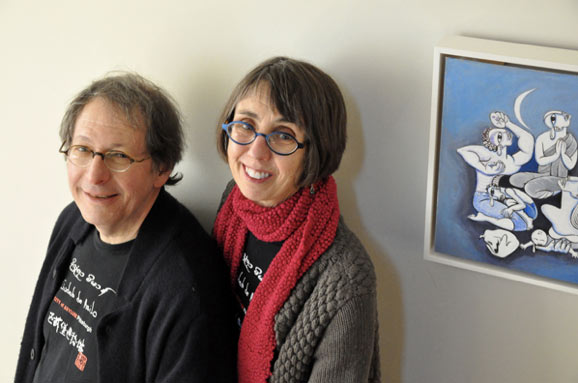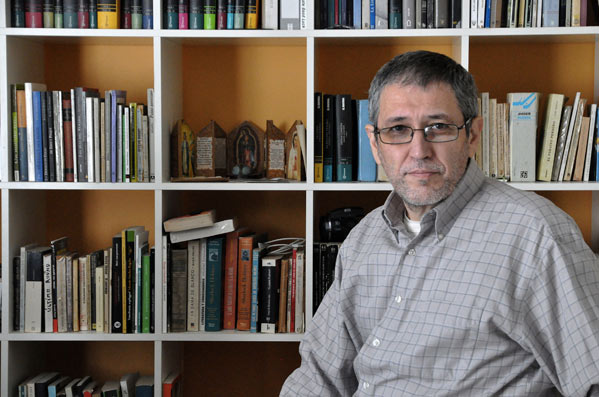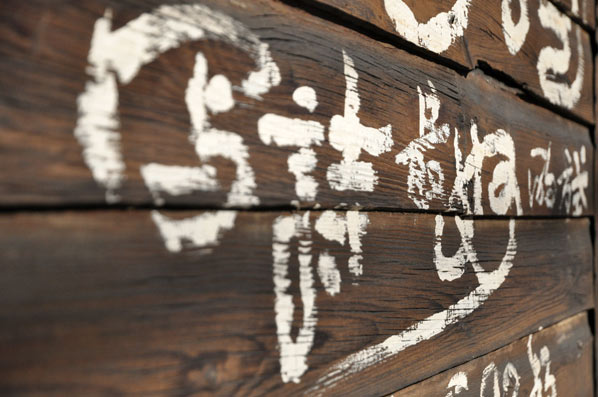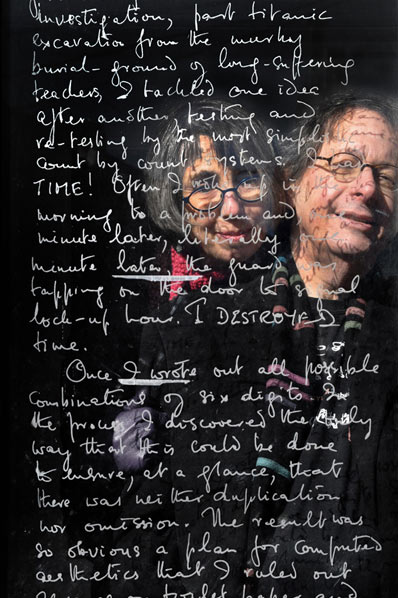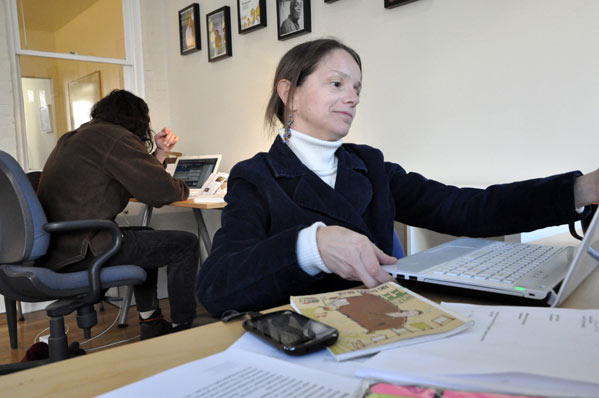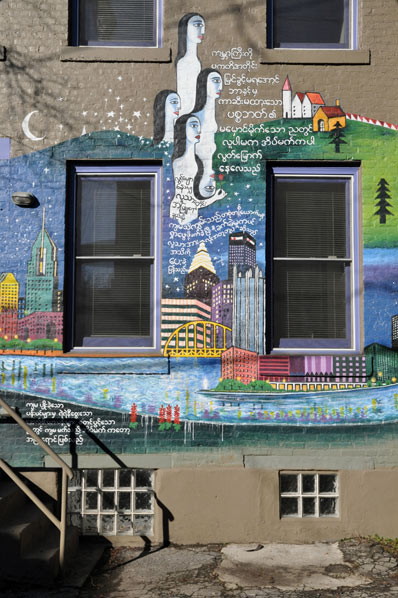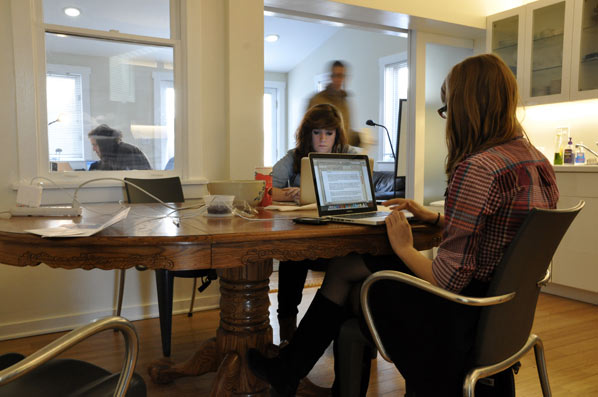This story first appeared in sister publication Pop City.
Alphabet City, a planned literary center in Pittsburgh’s North Side, will be like nothing else in Pittsburgh.
It will include a bookstore as well as free book distribution, performance spaces, and a café, serving as a home for writers, readers, and neighbors.
The latest project of City of Asylum/Pittsburgh (COAP) Alphabet City will be located in the heart of one of the city’s densest and most diverse neighborhoods, taking its place nearby other City of Asylum projects, all bearing the trademark of creative and colorful, yet meaningful design.
COAP co-founder Henry Reese says Alphabet City is meant to unite the community, to bridge differences in race, culture, and economics . “It can be a way for people to begin to understand one another, by being open and listening to the ideas of others,” he says.
The center—its location still under dispute—is the latest development of COAP, an organization that has changed and matured since its founding in 2004. But its core mission, to provide sanctuary to literary writers who were exiled and under threat of persecution, remains.
Cities of Asylum
In 1989, following the publication of his novel The Satanic Verses, author Salman Rushdie was forced into hiding. Amid wide protests of the book, Ayatollah Khomeini issued a fatwa ordering Rushdie killed. Rushdie was no longer safe because of words he had written.
And Rushdie wasn’t alone. In 1993, in response to increasing attacks on writers, and an assassination in Algeria, the International Parliament of Writers was formed.
In 1997, Rushdie gave a talk in Pittsburgh in which he mentioned the European Cities of Asylums network. Reese, and his wife Diane Samuels, a renowned artist, were in attendance that night and were moved to action.
Samuels and Reese worked on the project for five years, and with the help of author Russell Banks, brought the Cities of Asylum movement to the United States.
But unlike other programs, Pittsburgh’s chapter would not be based at a university. Instead, COAP is embedded within the community, with events often occurring in Reese and Samuels’ own home, a converted rowhouse that feels more like a modern and airy loft, with beautiful art throughout.
Writers brought to Pittsburgh are thought of as more than just asylum seekers; they’re the new family on the block, neighbors and members of the community. This immersion is part of the strategy to help exiled writers get their bearings in a new country.
“If one will succeed in a new life, it’s best to build it from within a community,” Reese says.
Over the past nine years, COAP has evolved to include an annual Jazz Poetry concert, poetry readings in neighborhood gardens, and striking house-sized murals on Sampsonia Way—none of which, Reese notes, was ever planned.
“It’s been surprising and in some ways exhilarating,” Reese says, “but we didn’t set out to do it.”
Reese, a retired businessman, and Samuels have lived in the Mexican War Streets since the 1980’s. After decades of neglect and disinvestment, many of the neighborhood’s Victorian homes were then vacant and in disrepair. At one point houses were sold for as little as $100.
The two began purchasing nearby properties on Sampsonia Way and amassed a row of homes that would later become residencies for exiled writers (though they didn’t know it at the time).
Reese, a Munhall native and lifelong reader, finds parallels between his former career—he made his fortune creating and operating telemarketing and call center services—and the book world. “Starting a business is a lot like writing fiction,” he says with a bit of humor. And now with COAP, that creative process continues.
When it came time to launch COAP, Reese sold his business interests—in Reese Brothers and CommComm—and invested $2 million of his own money into the program. He believes that to support the arts, one must also support those who are endangered.
“Writers, readers, and neighbors—we’re providing a safe place for all these things to happen,” Reese says. “In the process we are providing a safe place for our community.”
If These Walls Could Talk
COAP’s first writer in residency was Huang Xiang, a native of China. In the 1980’s, Xiang had been arrested for pro-democracy activities and sentenced to three years of labor; he was repeatedly tortured during his 12 years of imprisonment.
Free to speak his mind in Pittsburgh in 2004, Xiang went about doing so in dramatic fashion. During impromptu performances he shouted poems in Mandarin on the street. And then, loudly proclaiming his freedom to write, Xiang covered the wood façade of his home with calligraphies of poetry, still in evidence today.
In many ways, as COAP’s first resident, Xiang’s exuberant creations set the course for what the organization was to become.
Four writers and house publications later, Sampsonia Way has been transformed into a dynamic cultural destination. Thousands visit the alley for its lively murals and poems, and frequent readings. (Not to mention The Mattress Factory contemporary art museum which is just two doors down from Xiang’s House Poem).
Every September since 2005, hundreds crowd into the narrow alley for the annual Jazz Poetry concert, a festive collaboration of music and spoken word. There are dozens of additional readings each year, with visiting writers from South Africa, Australia, Haiti, and elsewhere—every continent except Antarctica. And all COAP events are free.
When writers do move on—to teach or write in a new place—it marks a successful transition, though losing a community member can be bittersweet. But it’s the point of the program.
“We want the writers in exile to succeed,” Reese says. “That’s the most important thing.”
And Reese believes that City of Asylum, like the exiled writers, should be able to stand on its own, without Samuels or himself. Although they conceived of the Alphabet City literary center, Reese plans for the community to ultimately take control.
“Other people have the imagination to take it other places,” he says. “If a community feels ownership of this, it’s much more important.”
Stay Tuned
On Tuesday, February, 12th, COAP will present a reading with Eduardo Halfon, a visiting writer from Guatemala. Halfon's newest novel, The Polish Boxer was called “funny and revelatory” by the New York Times Book Review. Click here to learn more and to reserve a seat at future readings.
And please note! Earlier this month, City of Asylum Pittsburgh was named a finalist for an ArtPlace grant, a nationwide creative placemaking initiative from the National Endowment of the Arts. Selected from more than 1200 applications, City of Asylum/Pittsburgh is one of 104 finalists and the only Pittsburgh organization to be named a finalist this year. Grant recipients will be announced in May.
ANDREW MOORE is development news editor at Pop City.
Photographs copyright Brian Cohen
For more of Pittsburgh's latest and greatest, sign up here to receive Pop City in your inbox for free every week.
